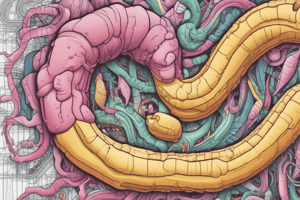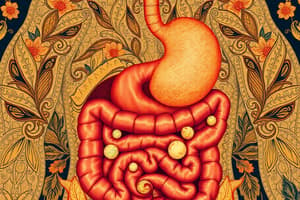Podcast
Questions and Answers
What is the purpose of hydrochloric acid in gastric juice during protein digestion?
What is the purpose of hydrochloric acid in gastric juice during protein digestion?
- Stimulates pancreas to release proteolytic enzymes
- Activates pepsinogen and aids in amino acid absorption
- Neutralizes the pH for optimal enzyme activity
- Kills some bacteria and denatures proteins (correct)
What is the role of pepsin in protein digestion?
What is the role of pepsin in protein digestion?
- Inhibits the action of pancreatic enzymes
- Hydrolyzes denatured proteins into smaller peptides (correct)
- Activates hydrochloric acid in gastric juice
- Neutralizes the pH of stomach contents
Why are dietary proteins too large to be absorbed by the intestine?
Why are dietary proteins too large to be absorbed by the intestine?
- The stomach lacks the capacity to digest large proteins
- Proteins are insoluble in the intestinal environment
- They must be hydrolyzed to their constituent amino acids for absorption (correct)
- Intestinal cells lack the necessary transport mechanisms for large proteins
Which organ is responsible for secreting pepsinogen, the inactive zymogen of pepsin?
Which organ is responsible for secreting pepsinogen, the inactive zymogen of pepsin?
What activates pepsinogen to form active pepsin in the stomach?
What activates pepsinogen to form active pepsin in the stomach?
What is the main function of acid-stable endopeptidase in gastric juice?
What is the main function of acid-stable endopeptidase in gastric juice?
Which enzyme is responsible for cleaving oligopeptides into free amino acids and smaller peptides in the small intestine?
Which enzyme is responsible for cleaving oligopeptides into free amino acids and smaller peptides in the small intestine?
What is the problematic fraction of gluten that can cause immune damage to the small intestine's villi in individuals with celiac disease?
What is the problematic fraction of gluten that can cause immune damage to the small intestine's villi in individuals with celiac disease?
Which hormone stimulates the release of a watery solution rich in bicarbonate for neutralizing pH in the duodenum?
Which hormone stimulates the release of a watery solution rich in bicarbonate for neutralizing pH in the duodenum?
Which disease can lead to abnormalities in the transport of cystine and dibasic amino acids, potentially causing kidney stones?
Which disease can lead to abnormalities in the transport of cystine and dibasic amino acids, potentially causing kidney stones?
Which enzyme hydrolyzes carbohydrates with α-1,4 and α-1,6 bonds, and is found in salivary and pancreatic secretions?
Which enzyme hydrolyzes carbohydrates with α-1,4 and α-1,6 bonds, and is found in salivary and pancreatic secretions?
What happens to cellulose due to the lack of a specific enzyme in the human body?
What happens to cellulose due to the lack of a specific enzyme in the human body?
Where does the digestion of disaccharides into monosaccharides take place?
Where does the digestion of disaccharides into monosaccharides take place?
What enzyme continues the process of carbohydrate digestion in the small intestine?
What enzyme continues the process of carbohydrate digestion in the small intestine?
Which enzyme is responsible for breaking down lactose?
Which enzyme is responsible for breaking down lactose?
What can abnormal levels of serum α-amylase indicate?
What can abnormal levels of serum α-amylase indicate?
Which hormone regulates the secretion of digestive enzymes?
Which hormone regulates the secretion of digestive enzymes?
What is the clinical consequence of lactose intolerance?
What is the clinical consequence of lactose intolerance?
Which of the following enzymes convert trypsinogen to trypsin?
Which of the following enzymes convert trypsinogen to trypsin?
What is the normal serum level of a-amylases?
What is the normal serum level of a-amylases?
Which of the following enzymes is deficient in an infant with diarrhea and abdominal distention after breastfeeding?
Which of the following enzymes is deficient in an infant with diarrhea and abdominal distention after breastfeeding?
What are some effects of Cholecystokinin (CCK)?
What are some effects of Cholecystokinin (CCK)?
What amino acids transport is affected in cystinuria?
What amino acids transport is affected in cystinuria?
What is the source of proteolytic enzymes?
What is the source of proteolytic enzymes?
What converts trypsinogen to trypsin?
What converts trypsinogen to trypsin?
What enzyme stimulates the release of pancreatic digestive enzymes?
What enzyme stimulates the release of pancreatic digestive enzymes?
Flashcards are hidden until you start studying
Study Notes
- Substrate for intestinal disaccharidases: Disaccharides like isomaltose, maltose, sucrose, and lactose
- Intestinal disaccharidases' location and enzymes: 1) Isomaltase and α(1,6) glucosidase at the jejunum mucosal lining, 2) Maltase and sucrose at the brush border membranes of the intestinal mucosal cells
- Starch and glycogen hydrolysis: α-amylase hydrolyzes α(1,4) glycosidic bonds in starch and glycogen, producing a mixture of short oligosaccharides and disaccharides (maltose and isomaltose)
- No carbohydrate digestion occurs in the stomach due to its acidic environment, which inactivates salivary α-amylase
- Pancreatic α-amylase continues the process of carbohydrate digestion in the small intestine
- Clinical significance of α-amylase: Abnormal levels in serum can indicate acute pancreatitis
- Digestion of carbohydrates in the small intestine: 1) Disaccharidases break down disaccharides into monosaccharides, 2) Monosaccharides are absorbed by the intestinal mucosal cells in the duodenum and upper jejunum using specific transporters (GLUTs)
- Lactose intolerance: Caused by lactase deficiency, undigested lactose in the large intestine leads to osmotic diarrhea, abdominal cramps, and flatulence due to bacterial fermentation
- Protein digestion: Produced by the stomach, pancreas, and small intestine, enzymes like HCL and Pepsin in the stomach, pancreatic zymogens (trypsinogen, chymotrypsinogen, elastase, and carboxypeptidases), and intestinal aminopeptidase complete the digestion and absorption process intracellularly
- Hormonal control: Hormones like cholecystokinin and secretin regulate the digestion and secretion of digestive enzymes
- Cellulose digestion: Cannot be digested due to the absence of an enzyme that can hydrolyze the β(1-4) bonds, but it has several beneficial effects
These bullet points provide a detailed summary of the key facts, figures, and entities discussed in the text, making it easier to understand the complex topic of carbohydrate digestion and absorption in humans.
Studying That Suits You
Use AI to generate personalized quizzes and flashcards to suit your learning preferences.




